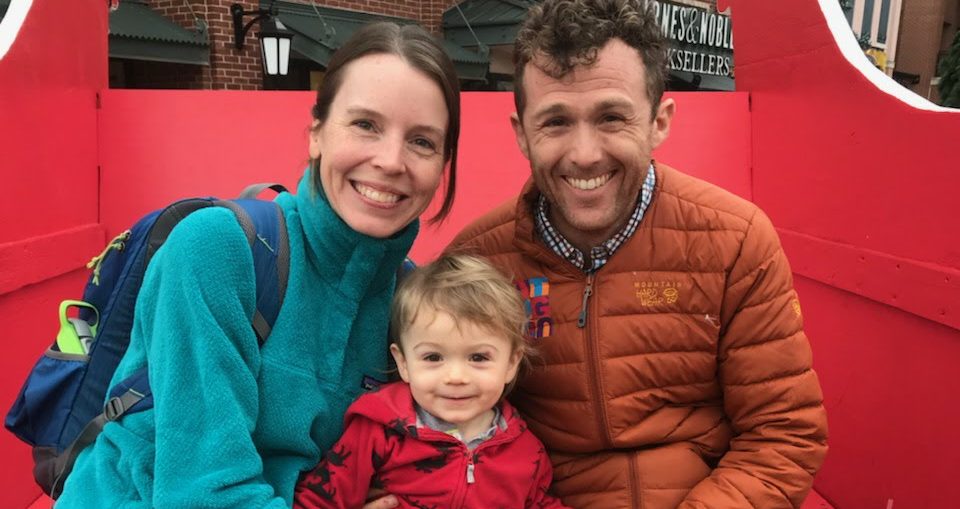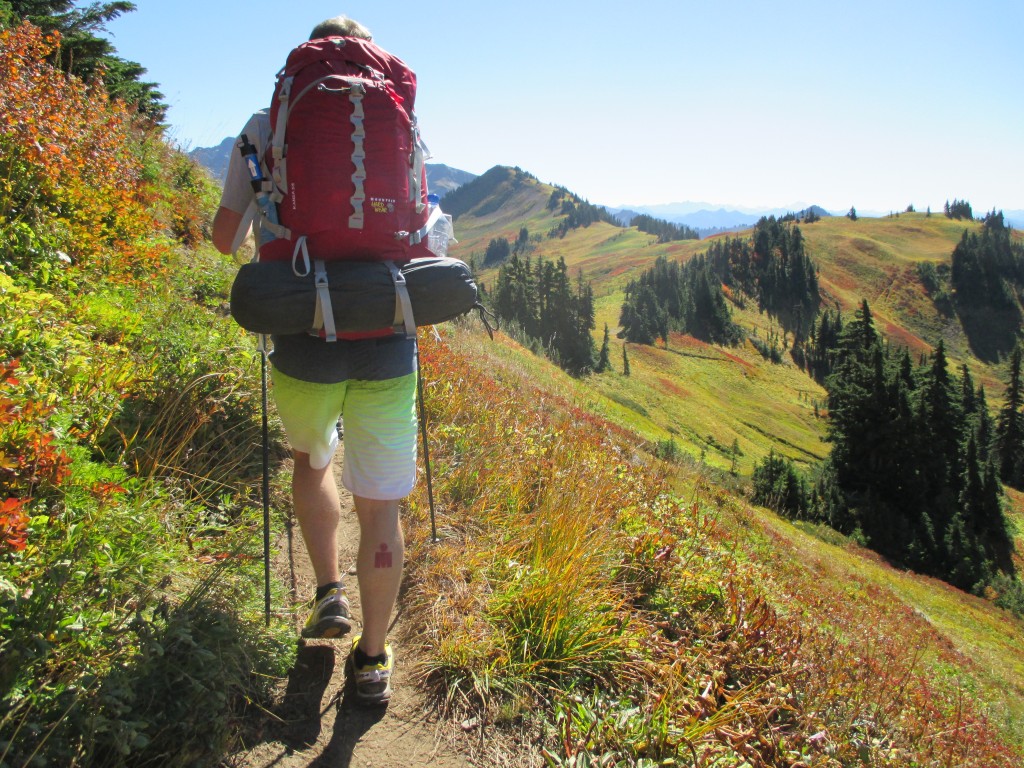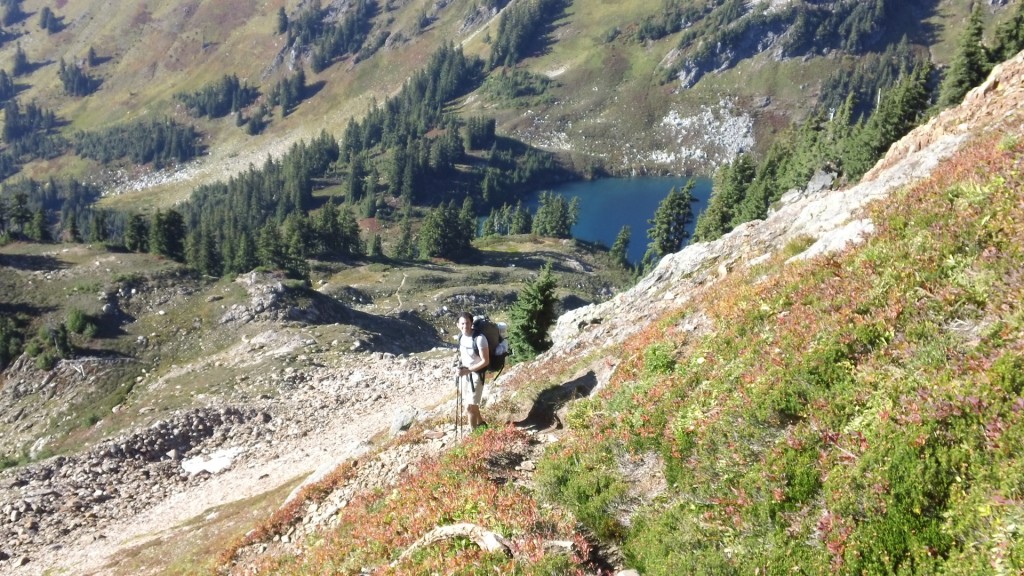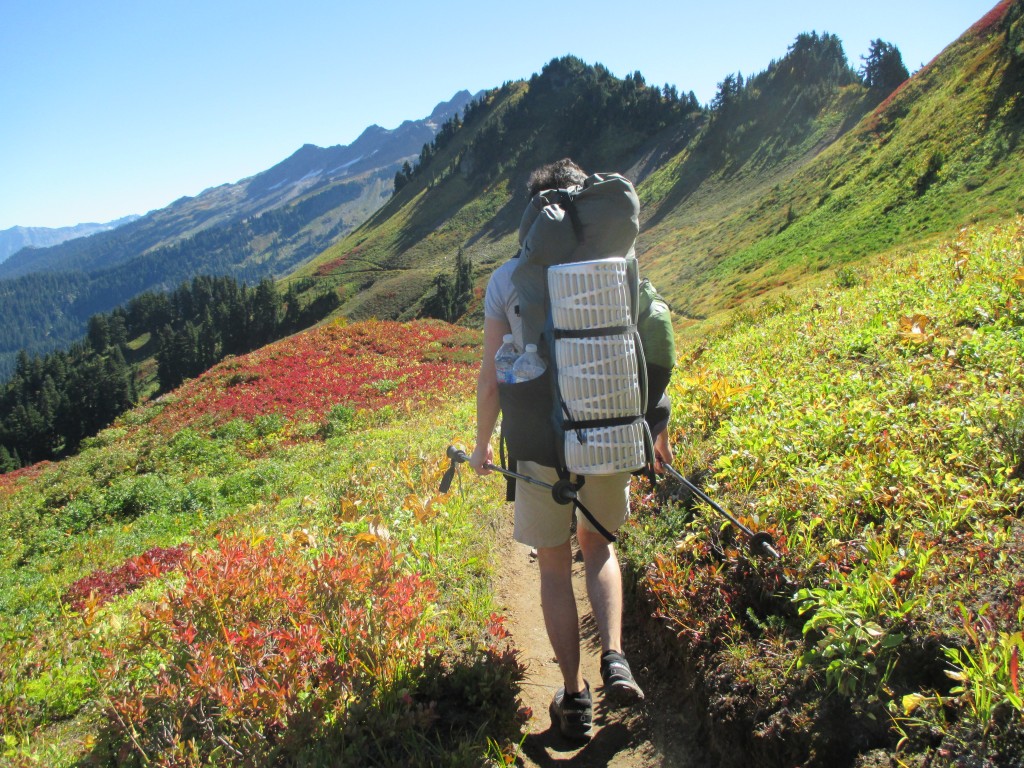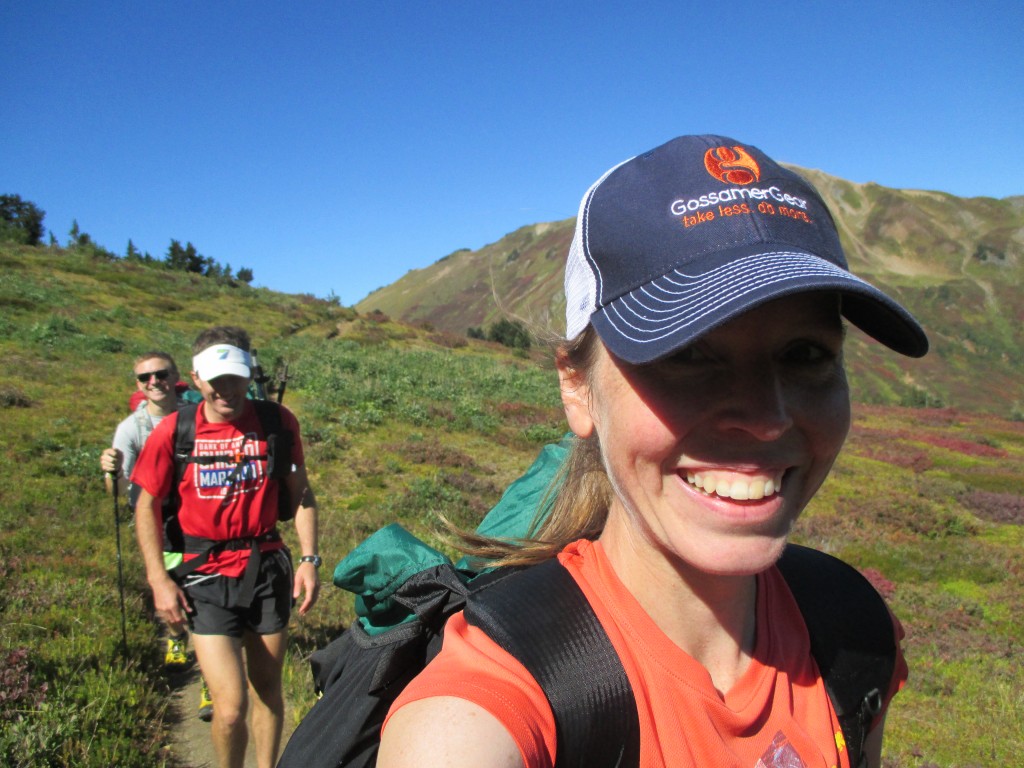I may not be the most outdoorsy hiker out there, but I know that I’m definitely a hiker who can live outdoors. The two qualities are entirely distinct and I never quite knew the difference until two weeks ago when Matt and I went backpacking with a newbie. Two friends of ours had never been backpacking; one had been hiking quite a bit, but only car-camping, and the other hadn’t done much of either, though he was accustomed to city-walking in San Francisco. Anyone who’s ever visited that magical city and been shocked by the amount of hills packed into its borders knows that the streets can offer a legitimate workout, allowing tourists to burn calories from one delicious meal to the next.
The backpacking task ahead of us was a twenty-nine mile loop, the White Pass – Pilot Ridge Loop in the North Cascades, a portion of which was on the PCT, with a total gain of 7,500 feet, topping out at 6,360 feet. Due to our San Francisco friend’s late afternoon flight arrival and typical Seattle traffic on a Friday afternoon, aka 10 miles an hour on I-5, we didn’t get to the trailhead until after dark at 8:00pm. We had to return to Seattle by Sunday afternoon for our friend, Jed, so he could fly home to SF. Other than that, we were simply free to walk for a day and a half in the North Cascades with a 0% chance of rain and predicted temps of seventy degrees. It was a much-anticipated weekend because of the scenery ahead of us, the chance to be back on the PCT, and a chance to show our newbie friends a little glimpse into the backpacking life.
From the moment we started walking, it was apparent that Matt and I were in our element, that our friend Chris, an ultrarunner in Seattle, was only slightly out of his element because he’s spent so much time on trails, just not nights, and that Jed was the quintessential fish out of water. Yet it was also apparent that we had taken for granted, or at least not really noticed, the things we were good at when it came to living outdoors, only because Jed particularly, was so new at them. He wasn’t terribly bad at them and he took it all in stride, but there were some entertaining moments that distinguished our experience from one another. Here are a few examples:
I can see color in the dark
We night-hiked 4.5 miles that first night to the first known camping area and as we walked fairly flat miles through old growth-forest over rather smooth, sometimes rocky, rooty, terrain, I often yelled back, “Horse poop!” as I led our group of four, warning those behind me to watch their step. I realize we all likely step in poop over the course of a hike but if I can avoid squashing the dead center of a poop pile, I will.
A few seconds after I yelled back about the poop, Jed, who was right behind me, sounded surprised as he asked, “There’s horse poop? How can you tell?”
“It’s brown,” I said, in sort of a “duh!” tone.
“You can see color?!?”
Side note: It turns out Jed also didn’t realize he could adjust his headlamp so that the light pointed downward in his path. He thought he had to tilt his head downward in order to see the ground. I’m still not sure if he could see color after that, but hopefully he could see better.
I know to eat
What do I mean, I know to eat? Don’t we all know to eat? We do, but we’re not accustomed to looking at food as fuel. We look at food as something we consume when we’re hungry, when we’re bored, when something delicious is put in front of us, or at certain times of the day when it’s the socially normal thing to do. When I’m hiking I think of food as fuel to put in the tank, knowing it will be burned off later. I keep my tank at least a third full, knowing that when I let it get down to the last quarter or less of fuel, that last bit of fuel always seems to go faster than I realize. In those cases, before I know it, I’m bonking and sitting on the side of the trail, possibly crying for no apparent reason other than I’m just out of fuel and need to eat.
That first morning, awaiting us just two miles into our day was a 3,500 foot climb. I knew at breakfast to load up on calories because of what was ahead, but saying that sentence to a newbie, “Hey, don’t forget to eat this morning because we have a 3,500 foot climb in less than two miles, especially because you’ll be carrying full water from the river since there isn’t a source for a while,” was nearly speaking another language.
Matt, Chris and I ate breakfast as we packed up, a combination of granola bars, trail mix, and dried fruit. Jed, on the other hand, didn’t eat. He was so wrapped up in packing up for the first time, including taking down his tent for the first time, that he simply forgot to eat. None of us had noticed either since we all had our own bags to pack.
As you probably guessed, Jed bonked hard on the uphill and had to sit and eat for fifteen minutes on the side of the trail before he could continue.
After that he took in calories every time we did.
I know how to go light
This is the skill with the most repercussions if not learned or practiced. Step in a pile of poop? It will eventually come off. Bonk on an uphill? Sit down and refuel. Pack too much stuff on a backpacking trip? Yep, you’re stuck with all that stuff the entire time.
I tried to do an AT style “pack shakedown” on Jed’s pack before we left the trailhead on Friday night. We had supplied him with a pack, a one-person tent, a sleeping pad, and a sleeping bag, all equating to just over 6.5 pounds, so not ultralight but certainly lighter than most beginners. He was responsible for his clothes, food, and small toiletries. We even supplied him with a headlamp and Matt and I carried items like water purification, a first aid kit, and a stove for the group.
At first Jed was open to hearing me out on what he should take, but after a while, when he realized the overarching trend in my advice was that he shouldn’t take much of anything, he started stuffing everything in his pack, “just in case.”
Oh, those three dangerous little words. They are the root cause of sore hips and shoulders to many a backpacker who mutters them while packing. Despite my warnings to Jed that his pack would be ridiculously heavy, he continued to carry about 5 pounds of toiletries, including shampoo and conditioner, a 100 pack of baby wipes, three packs of tissues, and toilet paper, among other items like too many clothes and random useless items. As you’ll soon find out, he didn’t use any of those toiletries.
Later into the trip, while Jed and Matt were walking alone together, Jed said to Matt, “I realize now that Julie was trying to help me by taking stuff out of my pack.”
I can poop outside
What’s a good trail story without poop involved? And no, horse poop doesn’t count.
At this point in our hiking “career”, we are very comfortable with pooping outside. My only caveat is that I hate pooping in the middle of the night. I will hold it until daylight, if possible, whereas Matt has to heed the call at any time, or he will literally poop his pants because he can’t hold it.
For each of the two mornings on the trail, Matt and I both engaged in our morning pooh just like any other morning at home, and Matt took his typical mid-day pooh-breaks too. Yet in the 39 hours we were on the trail, neither Chris nor Jed pooped. Neither ever had the urge to poop and I imagine they were ok with that, letting nature hit them when they returned home to a normal toilet. I know of people who have taken pills to constipate themselves so they won’t have to poop outside. My theory is that most newbies are a little dehydrated and a little scared of pooping outside, mainly because it’s so different from our normal routine, that their mind and body kind of work together to keep it all inside. Chris even ate a pound of dried fruit in one sitting and still didn’t have to poop – the last and only time I did that was on the PCT, after which I pooped my pants in one push of a fart.
It’s taken some time, but I can confidently say that I know how to successfully poop outside and dare I say, I even enjoy it.
Thank you to Chris and Jed for joining us on such a fun trip, and for teaching us lessons that we hadn’t realized we learned, and for being good sports as you learned your own along the way.
